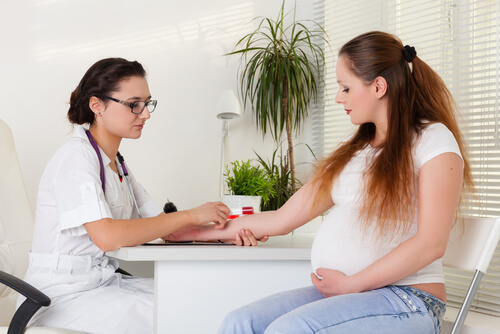When Can You Ask for Maternity Leave during Pregnancy?

From the beginning of their wonderful journey, expectant mothers who work start to wonder when they should ask for maternity leave during pregnancy.
Doctors recommend that women request the leave two months prior to delivery, considering the typical discomforts that result from this condition.
Despite the recommendation, pregnant women nowadays strive to work until the last days of their pregnancy. They do this in an attempt to save up the days of maternity leave in order spend the longest possible amount of time attending to their newborn.
For the wellbeing of the mother and her future baby, the nature of the pregnant woman’s work should be taken into account. Although pregnancy is a normal condition and not a disabling disease, certain work demands can be detrimental to the gestation process.
Some jobs require standing or sitting for long periods of time, lifting heavy objects, intense pressure, or frequent bodily movements. These working conditions are incompatible with a pregnancy that is far along.
Apart from general weight gain leading to discomfort when completing these activities, the mental or physical effort they require can also be harmful to the gestational process.
As a result, the Spanish Society of Gynecology and Obstetrics has prepared a guide for women in these situations.
In it, they give recommendations regarding when a woman should request maternity leave during pregnancy, according to the level of physical activity required at her work.
Recommendations for requesting maternity leave during pregnancy
The Spanish Society of Gynecology and Obstetrics provides the following criteria and risks to determine when women should request maternity leave:
- Standing for long periods of time. Standing for more than three hours continuously has been associated with premature birth and a lower rate of growth for the fetus. The risk increases if the pregnant woman suffers from varicose veins.
- Lifting heavy objects. Doing this is very dangerous in the final stage of pregnancy, considering the pressure that the activity exerts on the belly. Additionally, using the wrong technique to lift heavy loads can cause more damage.
- Climbing stairs. This is an activity that, if done very frequently, leads to great physical demand, which adds to the gain of abdominal weight.

Schedule of weeks and associated risks
These are some activities that should be avoided at work during each of the listed weeks of pregnancy:
Week 18
- Lifting objects heavier than 10 kilos, four or more times per shift.
- Crouching down below the knee more than ten times every hour.
Week 22
- Standing for more than four continuous hours per shift.
Week 26
- Crouching down more than twice per hour.
- Climbing stairs more than four times per shift.
- Lifting objects heavier than five kilos more than four times per shift.
Week 30
- Standing intermittently for more than 30 minutes per hour.
Week 37
- Remaining standing for more than four hours a day and more than 30 minutes per hour.
- Crouching down below the knees twice or more per hour.
- Climbing stairs four or more times per shift.
- Lifting objects heavier than five kilos four or more times per shift.
“The nature of the job performed by a pregnant woman should be taken into account; certain work demands can be detrimental to the gestation process”
Other work factors that pose risks for pregnancy
Apart from the aforementioned, other work tasks aren’t ideal during the middle and final stages of a woman’s pregnancy.
These factors may play a role in an expectant mother’s decision of whether or not to ask for maternity leave during her pregnancy.
One of these is the requirement to remain seated for long periods of time.
Spending too much time sitting down and in the same position can have negative impacts on a person’s back. Weight gain during pregnancy can then aggravate these back problems.
Other aspects for you to take into account are:
Fatigue
A mother’s wellbeing during pregnancy is extremely important. An excessive burden of work or very demanding work activities can negatively affect this wellbeing.
Faced with this reality, it’s important for pregnant women to reduce the number of difficult or stressful tasks they deal with at work, which may involve delegating the work to others.

Stress
The intensity and duration of work-related stress is incompatible with the ideal conditions that pregnancy requires. This is also influenced by the personality of the pregnant woman.
Respiratory and relaxation exercises are necessary in cases of high pressure and stress.
Work that is dangerous by nature
If your work involves handling hazardous materials or other high-risk activities, you must take a break from your job for the duration of your pregnancy.
Additionally, if a pregnant woman suffers from a health condition, it’s necessary to provide her with the set of conditions she needs to get through her pregnancy without any added risk.
Asking for maternity leave during pregnancy should be a decision that doesn’t affect the health of the mother and the child.
Expectant mothers should always consult with their doctor, who has control over a big part of the process.
It’s necessary for the mother to make a responsible decision with regards to this matter and to take into account the particularities of her situation and the type of work she performs.
This text is provided for informational purposes only and does not replace consultation with a professional. If in doubt, consult your specialist.
